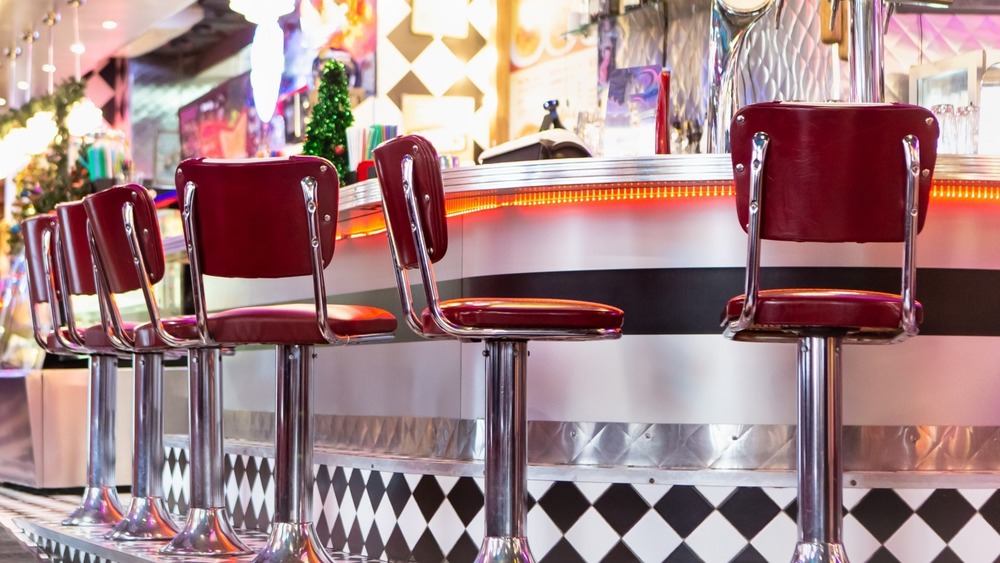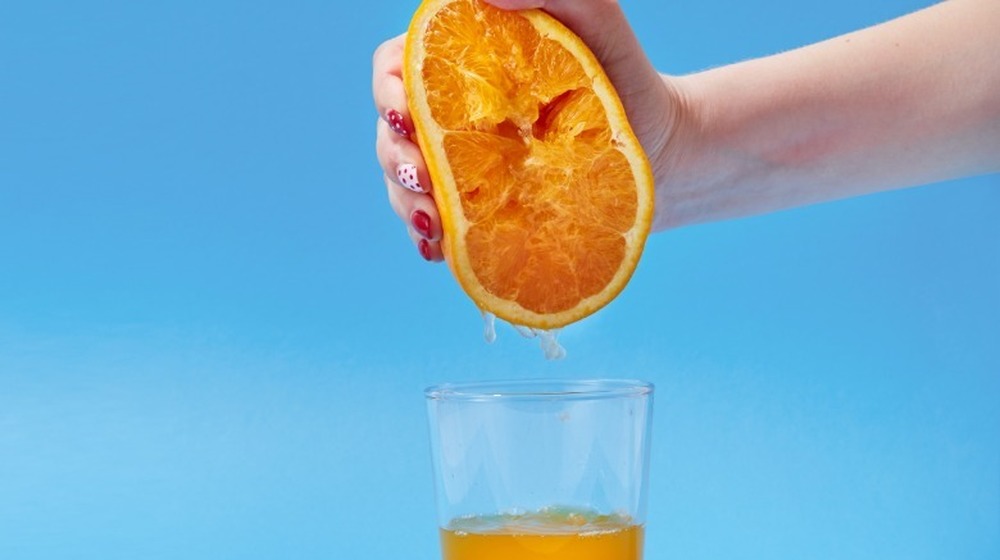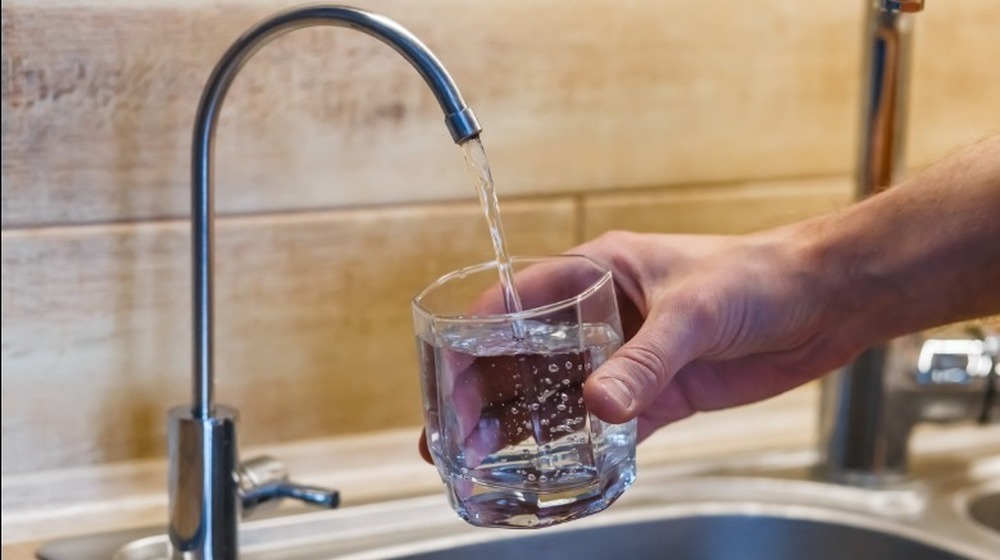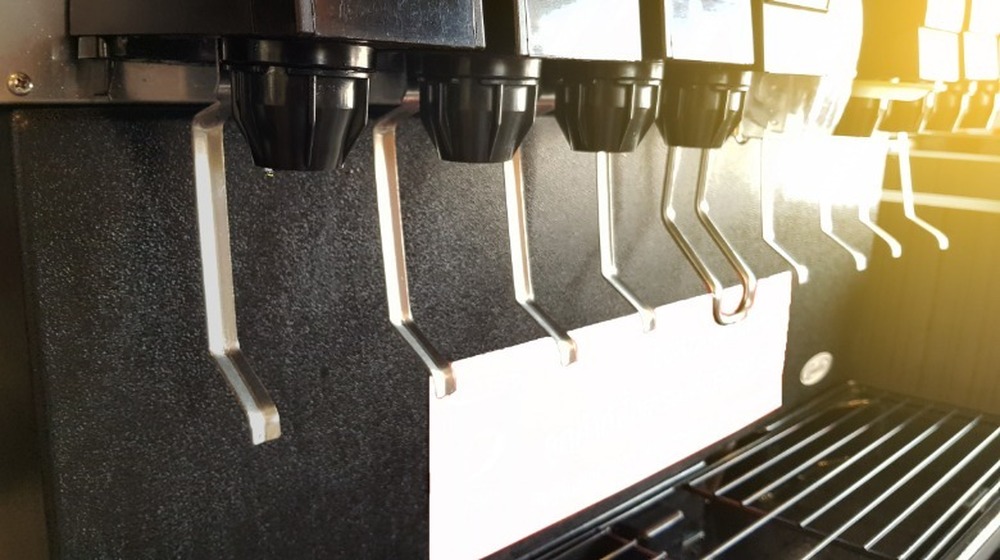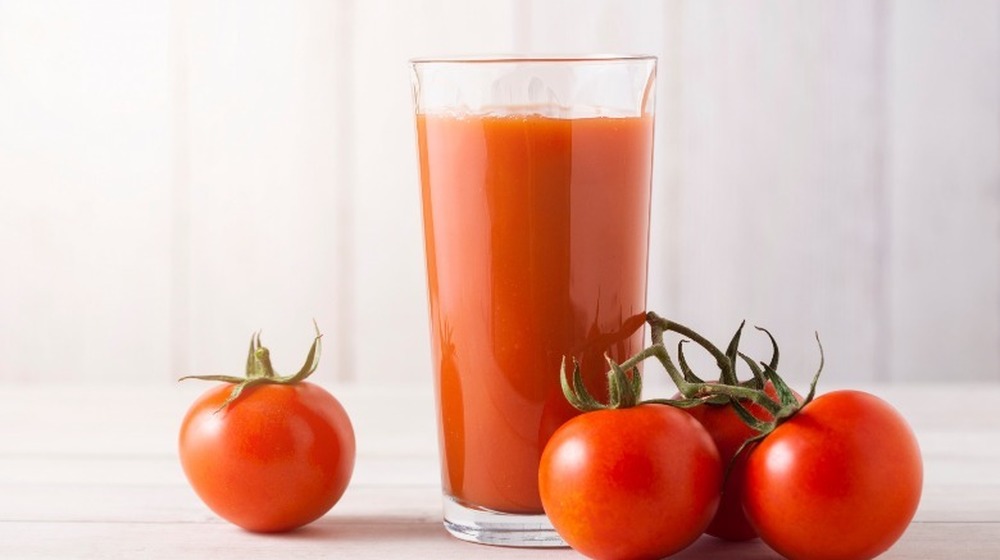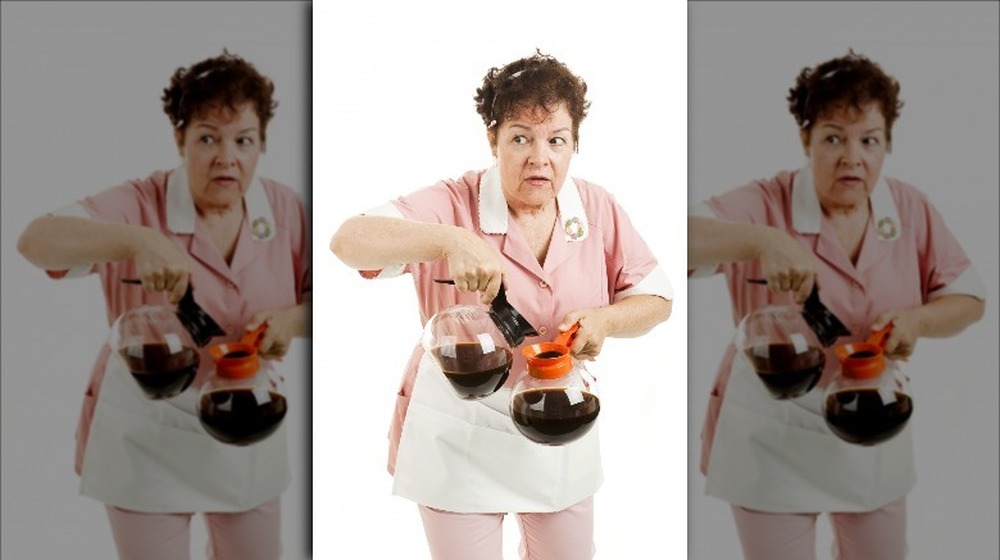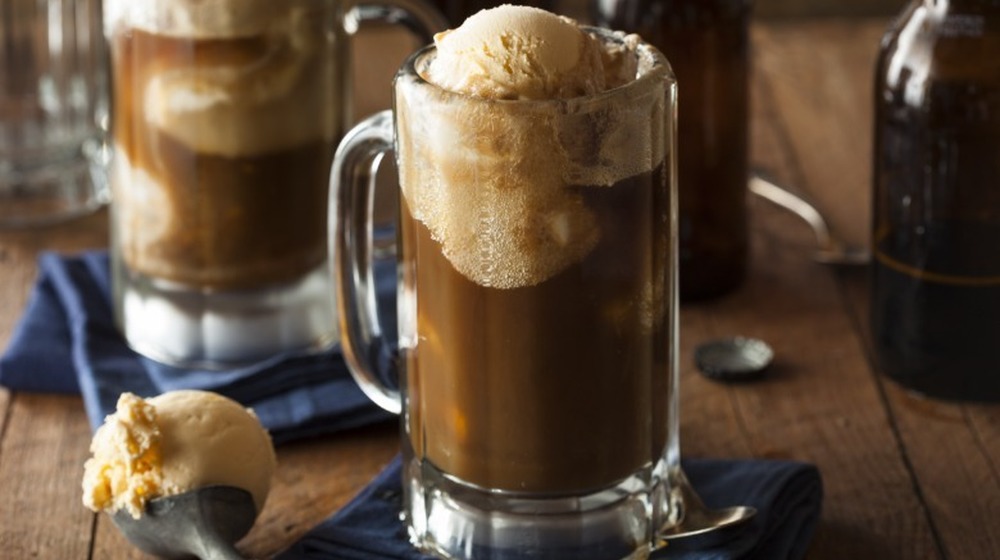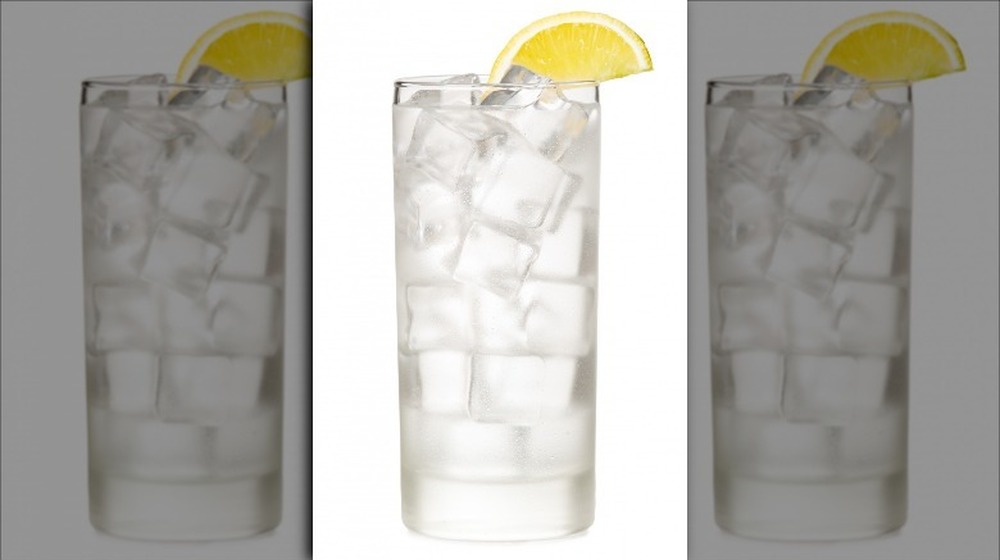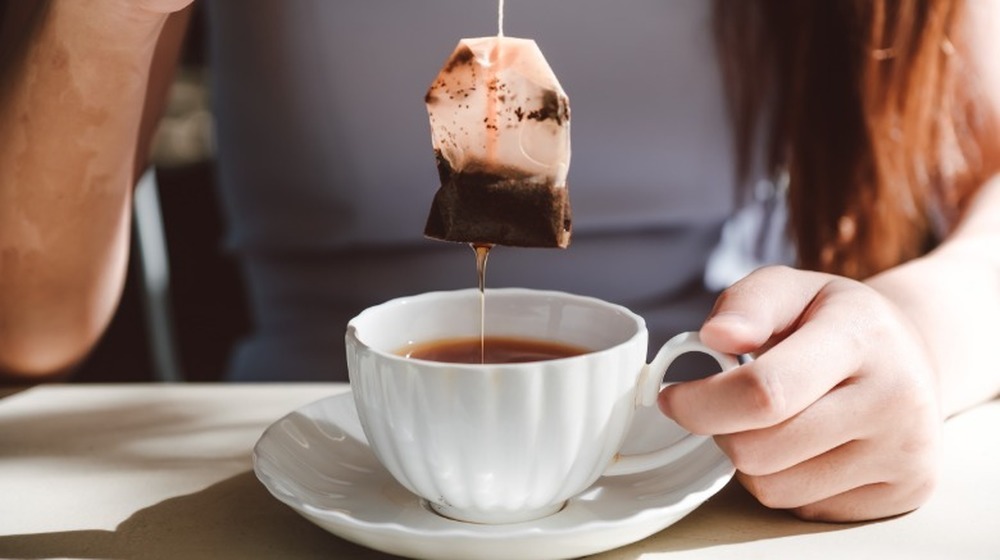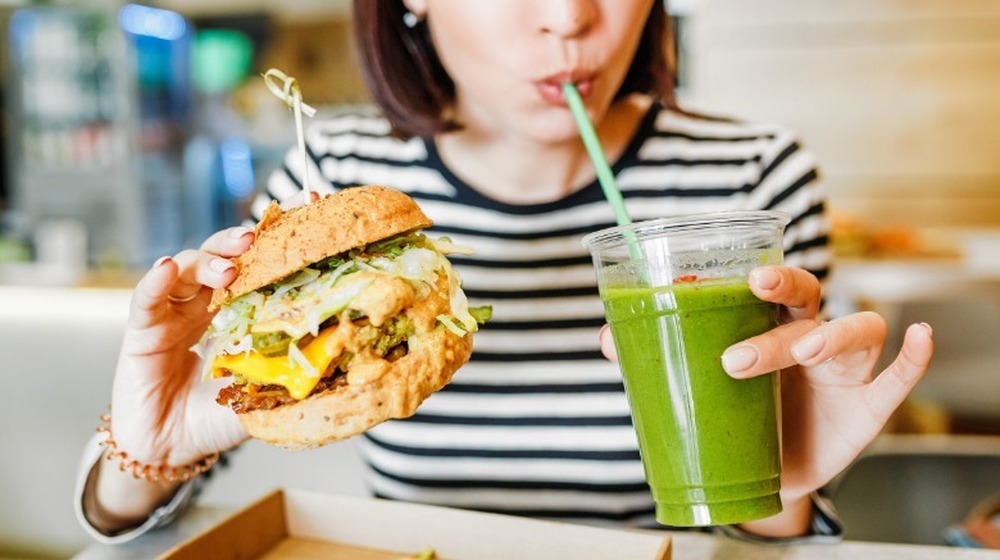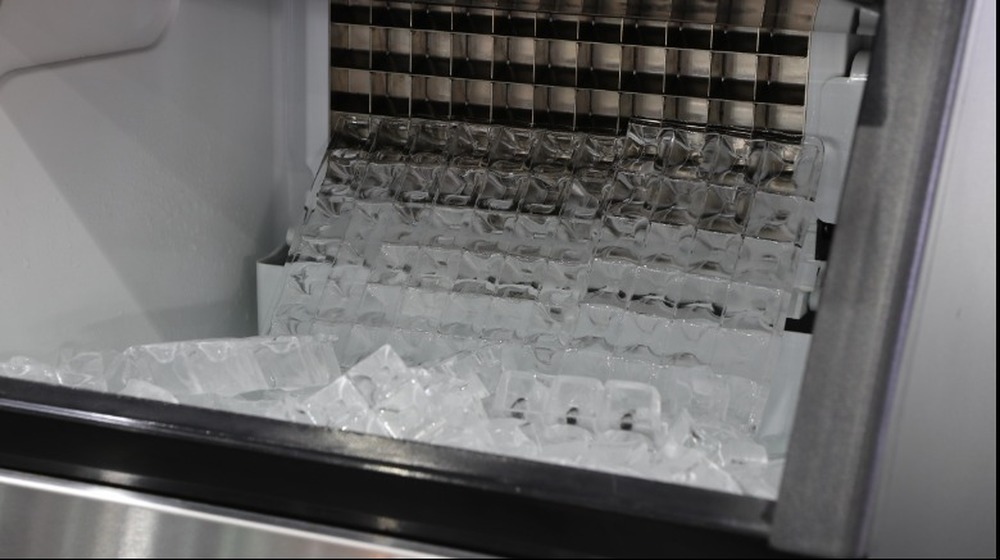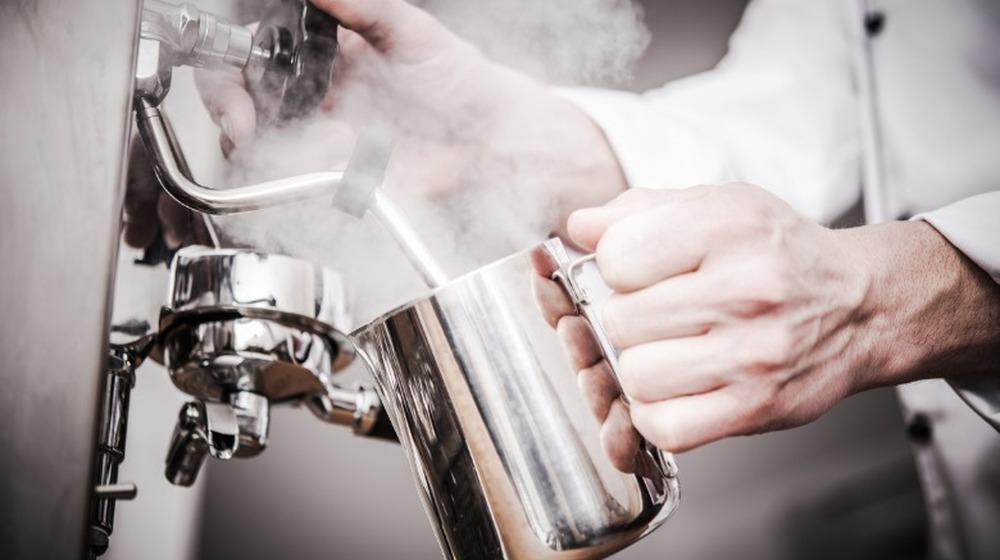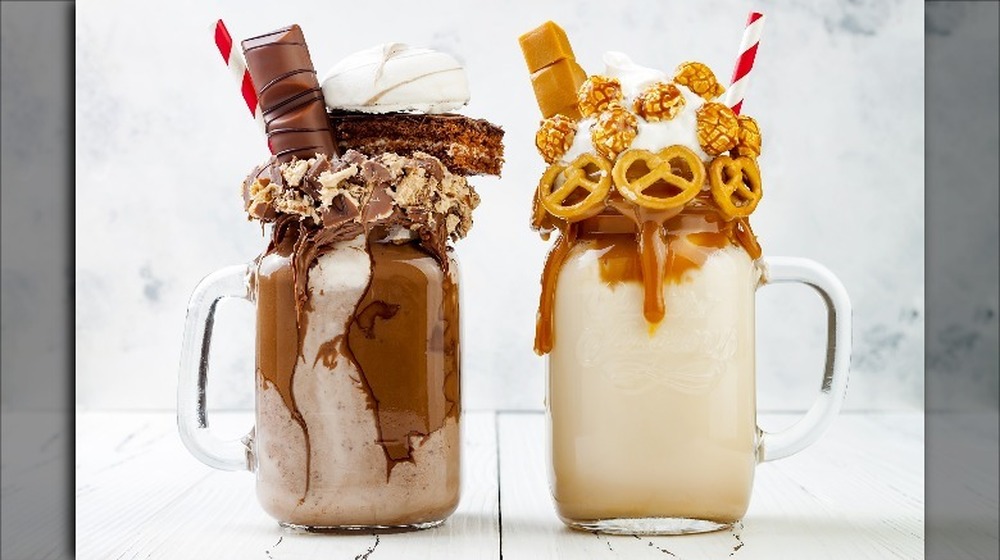Drinks You Should Never Order At A Diner
There's always a little risk when it comes to dining out, and your experience is fiercely dependent upon a restaurant's quality and food selection. However, diners fall into a more unique category. Sometimes the seediest saloons serve the best eats, while fancier establishments churn out chow that resembles dog food. No matter what your relationship with diners, there's just something you can't help but love. But let's be honest. There's definitely some dodgy drink menu items that you should never order from a diner, and they may be more common than you think.
Serving a cup of coffee or a glass of juice sounds easy enough, but sometimes the simplest of orders are shown the least amount of love in the diner kitchen. Cleaning ice machines, scraping milk steamers, and filtering tap water are just a few of the routine tasks each eatery is expected to execute daily. But the same way we get lazy with our nagging household chores, diners often skimp on these cleaning rituals, which is probably why the waitstaff passes on their own servings of coffee and ice cold cola. Germs, excessive calorie counts, and spoiled ingredients are just a few of the reasons why you'll also want to ditch these dubious diner drinks immediately.
Freshly squeezed fruit juice
Squeezing ripened fruit juice into a cold glass is straight up delicious, not to mention highly nutritious. But don't be fooled by the sound of this refreshing beverage. You will most definitely want to pass on the juice drink from your local diner, and you can thank thousands of fruit-loving germs for that.
Over the past few years, the U.S. Food and Drug Administration (FDA) has received countless reports of food poisoning that have been traced to drinking "fruit and vegetable juice and cider that has not been treated to kill harmful bacteria." Fruits, vegetables, and dairy products are typically put through process known as pasteurization, in which they are strategically heated to certain temperatures to kill any illness-causing agents. Thanks to this germ-fighting practice, pasteurized produce greatly reduces the risk of food poisoning after consumption. However, not all produce found in diners has been through this process and may still pass along some unwanted bacteria.
So the next time you're thinking about ordering a glass of "fresh" fruit juice from your favorite diner, keep in mind that it may contain destructive germs and pathogens that travel straight from the contaminated fruit right into your glass. We're hopeful not all diner fruits and veggies are tainted, but the juice is not worth the squeeze on this one. For now, it's best to pass on the fresh juice and stick with something safer.
Tap water
There's no debating that tap water tastes a bit funky. Even those unbothered by the tap know when they taste it. The U.S. is fortunate to have unlimited access to clean water, but it's not totally surprising that we're still shy of making the world's top 10 countries with the freshest water list.
If the stale-tasting water sensation doesn't scare you, the health risks involved in drinking tap water will. The health of our public drinking water is regulated by the United States Environmental Protection Agency (EPA). Back in 1974, this eco-friendly agency established the Safe Drinking Water Act to help maintain minimum standards to "protect tap water and requires all owners or operators of public water systems to comply with these primary (health-related) standards." While the EPA has since spent decades going to great lengths to rid our regular drinking water of harmful contaminants and poisonous metals, such as lead, mercury, and even arsenic, there's still no guarantees when sipping from the spout.
A glass or two won't kill you, but consuming large amounts of tap water, especially from a rusty diner faucet, will put you at a greater risk for consuming unwanted chemicals and bacteria. Try asking for sparkling water or bring along your own bottle of H2O.
Fountain soda
It's no surprise that soda is a notorious no-no on the nutrition list. When you order a soda to pair with your diner burger and fries, you are well aware of the fact that what you are ordering is essentially a large glass of sugar that possesses "no vitamins, no mineral, and no fibers," according to Healthline. But hey, you're not eating at a diner for the health benefits. What may shock you, however, is the ungodly amount of mystery germs that could be lurking in your next fountain drink.
E. coli bacteria and antibiotic-resistant microbes are just some of the of the dangerous contaminants found in some soda machines. CNN reported on a grossly shocking study published in the International Journal of Food Microbiology, stating that almost half of the 90 soda fountain beverages from one area in Virginia "tested positive for coliform bacteria — which could indicate possible fecal contamination." Yes, you read that right. Traces of poop were found in these fountain soda samples. The human immune system is capable of fighting off many foreign germ invaders, but when it comes to E. coli and fecal exposure, we run the risk of developing severe diarrhea, abdominal cramps, and even death, according to Science Daily. If that's not enough to steer you away from diner-served soda, then we're not sure what will.
Tomato juice
Adding on to our sketchy aforementioned fruit juice warning, tomato juice is another beverage to bypass for several reasons. Unpasteurized vegetables are a common concern at restaurants, since patrons have zero control of where the produce is purchased. Some diners solely stick to clean, organic products while others spring for more questionable bargain-based goods. If you come across a diner that makes their own tomato juice, drink it at your own risk. Those tomatoes may come from stores and farms that possess zero pasteurization practices, which means virus-causing bacteria may move from the diner's tomatoes into your juice.
Another reason to pass on this produce beverage is the added sugar and sodium. Vegetables, although great for your health, tend to taste "earthier" when squeezed straight from the source. As a result, diners opt for store-bought tomato juice, which can contain surprising amounts of sugar and sodium to substitute for the lack of flavor, according to Eat This, Not That.
Unfortunately it's lose-lose when ordering tomato juice at any diner. You can take your pick between unpasteurized veggies or a glass of sodium-heavy juice you easily can buy yourself at the grocery store. We suggest skipping the risk all together, but if tomato juice is a must at your next diner visit, ask the manager which version of tomato juice they use.
Any kind of coffee
Coffee is a daily staple for folks all around the world. This energy-boosting beverage is so popular that approximately 2.25 billion cups of coffee are consumed around the world every day, according to PBS. It's no surprise that next to eggs, bacon, and a pile of pancakes, the first thing that comes to mind when picturing a diner is a steaming cup of joe served in a bulky white mug. Whether it tastes great or gross, coffee is a standard beverage order fit for any time of day or night at a diner. But there's more to that lukewarm sludge than meets the eye.
If your next cup of diner coffee tastes weak, it probably is. A Kansas City waitress told Reader's Digest that after a certain point, all coffee should be considered decaf, "because no one wants to clean two different coffee pots." But one diner's decaf is another diner's caf. Your guess is as good as your server's when it comes to your coffee, according to ABC News. Whether you're looking for a strong, savory cup of mud or a decaffeinated nightcap, it's best to stick to Starbucks — there's no certainty when it comes to ordering diner coffee.
Root beer float
Soda is unhealthy on its own, but throw in a few scoops of ice cream and you've got one gut-busting beverage. Root beer has always been a notoriously dicey drink choice for many reasons, and if you've ever wondered what makes this soda selection taste so sweet, you can thank the horrific amounts of sugar and mercury-infused high fructose corn syrup, according to Nutrition Facts. Even the caramel coloring used to give root beer its infamous brown hue has been linked to cancer (via the National Center for Biotechnology Information).
And the frightful nutrition facts don't end there. Root beer, like the classic A&W, is also made with sodium benzoate or benzoic acid, which helps to prevent the growth of microorganisms in acidic foods. Although both benzoate and benzoic acid are natural substances, when mixed in a beverage with ascorbic acid (vitamin C), a chemical reaction occurs, resulting in a small amount of leftover benzene, also known as carcinogen, a possible cancer-causing agent.
Least of all your diner root beer float worries is the added ice cream, which we all know is a walking wellness nightmare. The National Center for Biotechnology Information (NCBI) has not been shy about sharing evidence linking nutrition and the human immune system. When combining sugar and dairy, especially in excess like in a root beer float, we are left with an even greater risk of illness, according to Sydney Greene, MS, RD on Eat This, Not That!
Water with a lemon wedge
Think you're safe from harmful health hazards with a lemon wedge and water? Think again. Dodging tap water is only half the battle when it comes to ordering this beverage. While lemon water can offer stellar wellness benefits, from flushing toxins from the body to aiding in digestion, it's what sticks to the lemon rinds that presents danger when ordered from a diner.
This mouth-puckering fruit is usually sliced and served by the dozens, but it's hardly ever washed. One waitress told Reader's Digest, "now that I've worked in a restaurant, I never ask for lemon in a drink. Everybody touches them. Nobody washes them. We just peel the stickers off, cut them up, and throw them in your iced tea."
If you've ever sat at the diner bar you've probably spotted these dirty lemon piles in the drink garnish lineup. Unrefrigerated and unprotected from airborne germs, these lemon wedges are just waiting to be sneezed on. Not to mention, most of the food and drink garnishes are handled by almost the entire waitstaff, who — let's be honest — probably don't wash their hands as well as they should. Let's just say we're not shocked to learn that a recent study found almost 70 percent of the lemon wedges tested from 21 restaurants found active microbes on the lemon rinds with "the potential to cause infectious diseases."
Regular diner customers should think twice before ordering any beverage served with a lemon or freshly cut garnish.
Hot tea
Boiling water, a piping hot pot, flavored tea leaves, sugar, honey, milk, AND a lemon wedge? Sounds like a lot of work for a measly cup of tea. Not to mention the repulsive bacteria residing on your lemon garnish waiting to make its way into your mug. Good Morning America tested lemons from six different popular family eateries and found that four of the restaurants' lemons were contaminated with fecal matter, including one sample that contaminated with E. coli — yikes! Boiling water may have help kill the germs on the lemon, but be wary of the residual germs that are transferred from the wedge to your cup.
In addition to dealing with that, if you want to avoid aggravating your waiter, we suggest skipping this hot beverage. Managing frequent water refills and finicky flavor manipulation is draining for any server. Diner employees work around the clock to make sure your dining experience is impeccable, and nothing annoys them more than a high-maintenance customer. Sending your server running to and from the kitchen, especially for tricky tea fixings, will easily put you on the naughty list. We don't want to scare you, but if you don't consider passing on this fussy refreshment, you may be the next pushy patron to receive revenge from your server. No spit in our salad or bacon grease on our garments needed here. Save the hot tea for your friends or your home kitchen. Diner employees have enough trouble on their hands.
Smoothies
One of the selling points to dining out is the opportunity to enjoy a dish you wouldn't typically make for yourself. That is why smoothies have made our list of banished diner beverages. No one should ever pay for something they can easily make themselves in a matter of seconds. While we respect the effort to order a well-balanced beverage, the dizzying guessing game of whether a diner has pasteurized or unpasteurized produce is enough to make us swear off the healthy stuff for good.
The appalling amounts of sugar are another reason to skip the diner smoothies. The American Heart Association (AHA) recommends no more than six teaspoons (25 grams) of added sugar per day for women and nine teaspoons (38 grams) for men. Just one Denny's Strawberry Banana Smoothie clocks in at 49 grams of sugar, which is almost double the daily limit from just one beverage!
A blended fruit and vegetable drink may be a great healthy choice, but save this sugar-filled morning drink for your own kitchen with your own ingredients. Chances are your store-bought smoothie ingredients will be fresher and safer at home anyway. We'll reiterate our earlier point: You're not eating at a diner to be healthy. You want lots of good greasy food at an affordable price. So don't waste your time and money on dodgy diner smoothies — your palate and your wallet will thank you.
Ice
You didn't think it was going to be that easy to order a cold diner beverage, did you? Ice may be one of the most important drink items to ditch at a diner. As you're well aware, ice is an essential aspect to chilling any cold drink. But ponder for a second how ice is made. Yup, you guessed it: diner ice is made from the same horrifying tap water we warned you against earlier.
But the tainted tap isn't the only concern when it comes to ice. No matter how nice the restaurant, almost every dining establishment's ice maker is filled with mold. Both waiters and kitchen staff have admitted to infrequently cleaning of their ice machines, with one anonymous barkeep revealing to the New York Daily News that "almost no restaurants or bars clean their ice machines as regularly as they're supposed to." Maybe the lengthy process involved in cleaning industrial-sized ice makers is to blame, but running the risk of serving contaminated, illness-causing ice is no excuse to be lazy.
So when you go to order your next cold, refreshing beverage, be sure to tell your waiter to kindly hold the ice.
Steamed milk and lattes
Breakfast is often called the most important meal of the day, and coffee has been a staple since the 15th century. Milk and coffee have also become a time-tested beverage marriage loved by caffeine admirers everywhere. In fact, folks loved milk and coffee so much that a buzz-worthy beverage including steamed milk with coffee was invented in the 1950s, known as the latte.
Although the inventor of the first latte is unknown, there truly is an art to crafting the perfect cup, and most diner kitchens are not the place for such a stellar creation. Diner kitchen staff may be capable of brewing an acceptable latte, but navigating the steamed milk machine, however, is an obstacle all its own.
Ordering steamed milk lattes from a diner is something even the waitstaff won't do. When asked on Reddit by Food & Wine what type of dishes should be avoided and why, one restaurant employee responded that they avoid places that make coffee and don't rinse out the milk pitcher after steaming milk. "This means it's likely the steam wand has crusty milk in it (that will have been cooked), the people aren't cleaning the coffee machine well, and your coffee will likely taste like s***." Even the prettiest-looking latte won't hold up to the sour steamed swirling inside.
Overdone milkshakes
One of the most famous diner offerings is the milkshake. Visions of poodle skirt-wearing teens and leather-jacketed greasers sipping through large red-and-white-striped straws flood our minds when we picture a true classic diner milkshake. This celebrated pastime continues to be a diner staple, but in today's world of excess, and with constant pressure to out-shine competitors, even milkshakes have been pushed to the extremes .
Fried Oreos, bacon bits, entire ice cream sandwiches, gummy worms, cotton candy, berry cereal, and baked s'mores only scratch the surface when it comes to the ingredients used in some of America's crazy milkshake concoctions. Dubbed "freakshakes" by fellow Australian foodies, these over-the-top diner milkshakes give us a stomachache at the very notion. A regular Peanut Butter Shake from Johnny Rockets clocks in at 1,160 calories, but add a few more dessert toppings and you've got yourself a day's (or two) worth of calories stuffed into one beverage.
Diners wear their messy milkshake creations like a badges of honor. Spots like Los Angeles' Big D's Burgers and Little Rock's Purple Cow Diner keep their menus stacked with substantially decorated shakes. But if you're watching your waistline, searching for gluten-free sides, or wanting a lightly loaded dessert-style drink, we recommend steering clear of all diner milkshakes.
